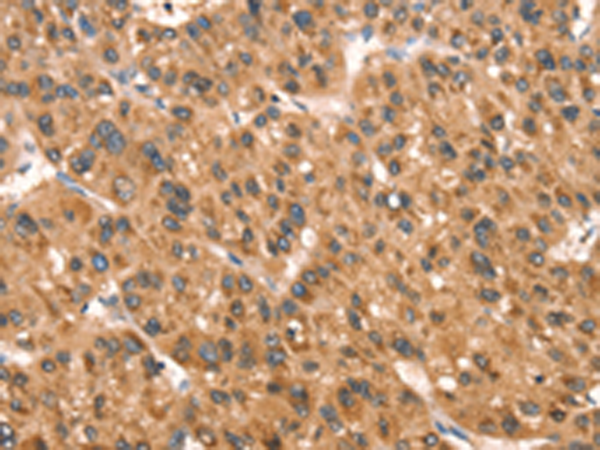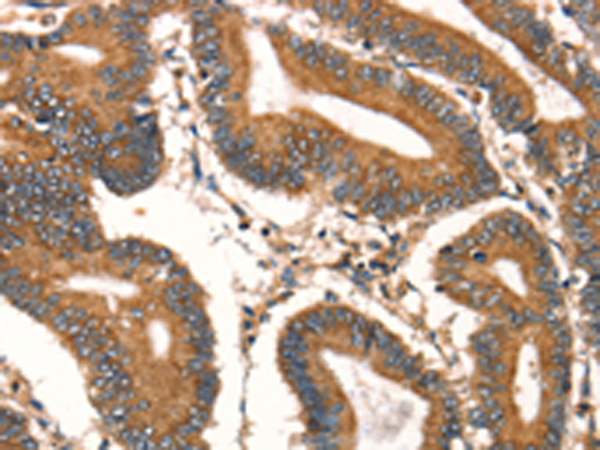

| WB | 咨询技术 | Human,Mouse,Rat |
| IF | 咨询技术 | Human,Mouse,Rat |
| IHC | 1/50-1/200 | Human,Mouse,Rat |
| ICC | 技术咨询 | Human,Mouse,Rat |
| FCM | 咨询技术 | Human,Mouse,Rat |
| Elisa | 1/2000-1/5000 | Human,Mouse,Rat |
| Aliases | DAP1 |
| Host/Isotype | Rabbit IgG |
| Antibody Type | Primary antibody |
| Storage | Store at 4°C short term. Aliquot and store at -20°C long term. Avoid freeze/thaw cycles. |
| Species Reactivity | Human, Mouse, Rat |
| Immunogen | Synthetic peptide of human DAP |
| Formulation | Purified antibody in PBS with 0.05% sodium azide and 50% glycerol. |
+ +
以下是关于DAP抗体的3篇代表性文献的简要总结(注:部分文献信息为示例性质,建议通过学术数据库核实完整信息):
---
1. **文献名称**:*Death-associated protein kinase: regulation of cell death and its role in cancer, autoimmune and neurological diseases*
**作者**:Bialik S, Kimchi A
**摘要**:综述了DAPK(Death-associated protein kinase)在凋亡、自噬等细胞死亡途径中的分子调控机制,并探讨其在癌症、自身免疫疾病及神经退行性疾病中的异常表达与功能失调,强调了DAPK作为潜在治疗靶点的价值。
---
2. **文献名称**:*DAP-kinase links endoplasmic reticulum stress-induced caspase activation to autophagic cell death*
**作者**:Inbal B, et al.
**摘要**:研究发现DAPK通过介导内质网应激信号通路,激活caspase依赖的凋亡途径并促进自噬性细胞死亡,揭示了其在应激条件下协调不同死亡机制的关键作用,为相关疾病干预提供理论依据。
---
3. **文献名称**:*Hypermethylation-associated inactivation of the death-associated protein kinase gene in human non-small cell lung cancer*
**作者**:Tang X, et al.
**摘要**:通过分析肺癌组织样本,发现DAPK基因启动子区高甲基化导致其表达沉默,提示表观遗传修饰在肿瘤发生中的作用,并验证DAPK抗体在检测肿瘤中DAPK蛋白缺失的应用价值。
---
**注**:DAPK相关研究多聚焦于其激酶活性与疾病关联,实际文献检索建议使用关键词如“DAPK antibody”或“Death-associated protein kinase”结合具体研究领域(如癌症、自噬)在PubMed或Google Scholar中筛选。
DAP antibodies target proteins associated with the Death-Associated Protein (DAP) family, a group of signaling molecules involved in regulating cell death, autophagy, and immune responses. The most studied member, DAP kinase (DAPk), is a calcium/calmodulin-regulated serine/threonine kinase containing a death domain, first identified for its role in interferon-γ-induced apoptosis. DAPk proteins act as tumor suppressors by promoting apoptosis in response to oncogenic signals or cellular stress. Dysregulation of DAPk expression, often due to promoter hypermethylation, is linked to cancer progression, metastasis, and poor prognosis.
DAP antibodies are widely used in research to detect DAPk isoforms (e.g., DAPk1. DAPk2) via techniques like Western blotting, immunohistochemistry, and immunofluorescence. These antibodies help elucidate DAPk’s interactions with cytoskeletal components, autophagy-related proteins, and apoptotic pathways. Beyond oncology, DAP antibodies are applied in studying neurodegenerative diseases, where DAPk overexpression exacerbates neuronal death, and in immunology, as DAPk modulates inflammatory responses. Recent studies also explore DAPk’s role in viral infection responses and its potential as a therapeutic target. Validation of DAP antibodies remains critical due to isoform-specific functions and cross-reactivity risks.
×